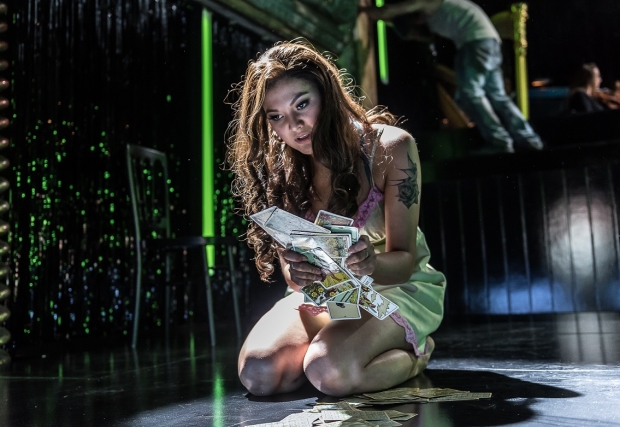Review: La Tragédie de Carmen (Wilton's Music Hall)

© Clive Barda
The bitter virtues of oranges ripened by the tropical sun, as the ad used to say, are almost the only scent of Iberia in this modernised and strangely glitzy account of La Tragédie de Carmen. The heroine peels one, a supernumerary unloads a bag of them… and that’s it. They’re all over the Wilton’s publicity, however. Small sevilles, mouldy and unappetising: they must symbolise something beyond marmalade but it’s unclear what. William Blake’s 'Sick Rose' – Spanish-style? Maybe.
In 1982, Peter Brook and the French playwright Jean-Claude Carrière reconceived Bizet’s opera as an 80-minute piece for four singers and chamber ensemble. Using multiple casts, La Tragédie de Carmen enjoyed a long and successful run at the director’s Parisian theatre, Les Bouffes du Nord, and was later made into a trio of films each with a different mezzo-soprano in the lead.
Brook’s focus on the opera’s central quartet, with singers exhaustively rehearsed as per his wont, made for an intense theatrical experience. His secret was to home in on character and to favour acting over singing, a priority that’s at the opposite end of the scale to this new account from the Royal Opera in which four expert singers from the Jette Parker Young Artists programme are accompanied by a small contingent from the Southbank Sinfonia.
Foil-strip curtains and coloured neon lights herald a nightclub re-enactment of Carmen rather than a character-driven drama. The artifice in Gerard Jones‘s production is accentuated by the placement of musicians high upstage, with the expressive conductor James Hendry facing us and singers occasionally popping up beside him while he works; but this cabaret mood stunts the dramatic ferocity.
'Jones can’t resist a gag'
Singers are as likely to address the audience as each other and a clear dramatic line is never sustained, partly because Marius Constant‘s musical reinvention is just Bizet’s Greatest Hits with a modernist tang, but mainly because the standard of French pronunciation is so poor.
Russian mezzo Aigul Akhmetshina had all Carmen’s vocal richness and sultriness but she was indecipherable. Likewise Gyula Nagy, the charismatic Hungarian baritone who sang a resonant Escamillo like an Elvis/Pharaoh but with tongue-tied élan. Anglophones Francesca Chiejina (USA) and Thomas Atkins (New Zealand) fared better as Micaela and Don José, the former infantilised in a pink cat-face sweater, the latter scruffed up like Jack Black, and they both sang their parts outstandingly well.
The intrinsic problem with Jones’s production is neither the update nor the language but the uncertain dramatic line. Not for nothing did Brook rename this The TRAGEDY of Carmen when he recast the work as a vortex of dark inevitability; but Jones can’t resist a gag. For instance, his Carmen throws not a flower but her knickers at Don José in order to turn his head, an act that renders him a bit pervy when later he sings about "sa douce odeur".
Moreover, he seems to forget that it’s The Tragedy of CARMEN, not of Don José, most crucially in his blocking of the final scene where Atkins dominates the stage and Carmen is placed to one side or else in other subservient positions that do not threaten his dominance. Fundamental stagecraft, this.
La Tragédie de Carmen runs at Wilton's Music Hall until 14 November. N.B. There are no performances on 5,6,9 or 12 November.










